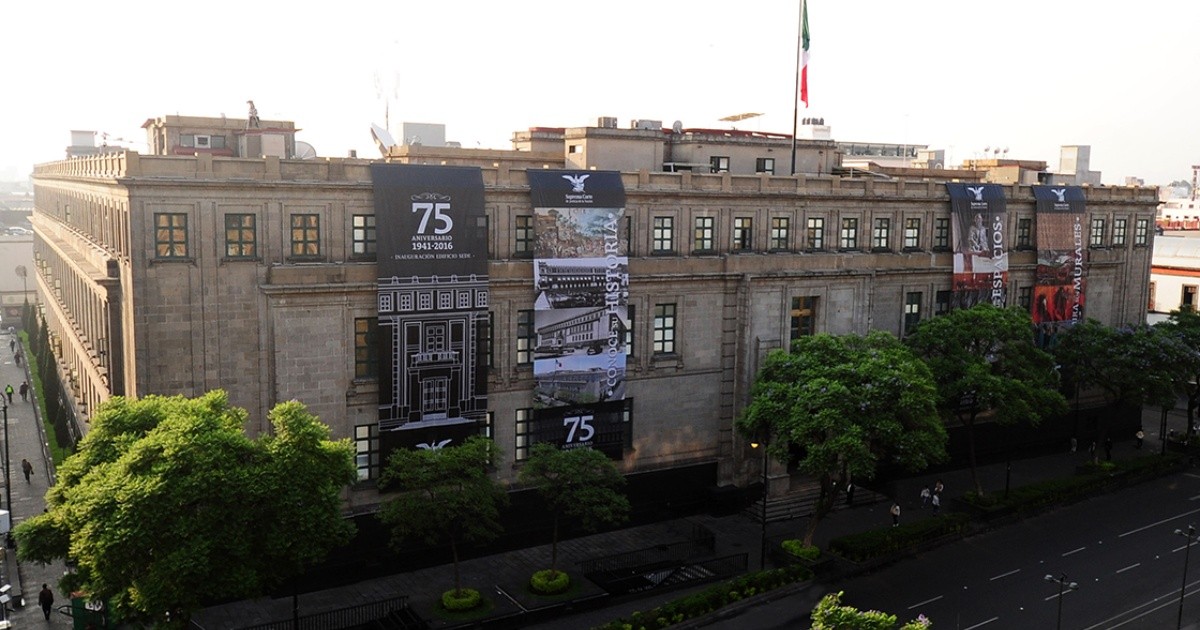The disqualifications and pressure exerted from the government of the president Andres Manuel Lopez Obrador to the Supreme Court of Justice of the Nation (SCJN) have caused it to act slowly and with dangerous political calculation in the resolution of matters involving decisions of the federal Executive.
In addition, there are hardly any public additions to the cases that are already being resolved, which allow us to analyze how the resolutions turned out. This is relevant because it is from these documents that the analysis of the repercussions that the resolutions of the SCJN will have can be made.
Progress of an investigation carried out Mexico Evaluates and what he shared with The Economist bear witness to the cases that seem to be sleeping “the sleep of the just”: there are matters that have been waiting for resolution for more than 1,000 days, such as the unconstitutionality actions related to the figure of the superdelegates, the National Detention Registry Law and the constitutional controversies related to the remuneration of public servants and the budget for the INE for 2019.
Saúl López Noriega, academic of the Division of Legal Studies of the Economic Research and Teaching Center (CIDE), states that, in order to form an opinion on the performance of the Court, it is necessary to take into account at least three important elements: compare the lag in relevant matters dealt with in comparison with previous six-year terms, analyze who is promoting the challenges and observe how rigorous the government is in legal terms when designing its initiatives and government policies.
López Noriega explained that if what is going on in the government of President López Obrador is compared with that of the president Enrique Pena Nieto —where many constitutional, legal and executive decree reforms also took place—, in the current one much more challenges have been promoted that the SCJN must decide.
On the other hand, although many judicial appeals that have reached the Court are promoted by legislative minorities or by the political opposition, if one carefully reviews who the promoters are, it is observed that the set of actors that have challenged is very plural. and in it are also autonomous constitutional bodies, civil organizations (via amparo trials) and federal entities (via constitutional controversies).
He stressed that if what is being challenged is reviewed, it is noted that, beyond whether the wisdom or the purpose of President López Obrador’s initiatives or public policies are good or bad, the way in which they were designed is very deficient. in legal terms.
In many cases, the bills were made in a very untidy way, “on the knees or on a hitchhike,” as they show very basic problems of constitutionality and procedure, he said.
That is very worrying, because they go so far as to forget that there is a division of powers. There are very serious errors in legislative technique, which shows that the Legal Department did not do the job of legally polishing these initiatives and, later, these errors were not corrected in Congress.
On the other hand, he commented that, although the Court has very different times from the dynamics of the Executive and Legislative powers, there are civil organizations such as Intersecta, which have made a calculation of the initiatives promoted by the federal government, although only those related to military and public security, in which they analyze the averages that it took to resolve in periods of some presidents of the SCJN and showed that there is clearly an upward difference in the times that it takes to resolve this type of issues in the presidency of the minister Arturo Zaldivar Lelo de Larrea compared to its predecessors.
He said that taking this exercise into account and, based on his experience following up the work of the Court, it can be said that there is an excessive delay and a political calculation in this regard.
The ministers play with the times
Laurence Pantin, coordinator of the Transparency in Justice and Special Projects Program at the México Evalúa think-tank and analysis center, commented that all governments have had decisions that involved constitutional or legal reforms that have been challenged, which is part of the political game and legal of the country.
It is normal for the government to make reforms and for there to be people who challenge them, and it is the SCJN’s role to decide what is constitutional and what is not.
He also drew attention to the fact that, many times, it happens that the most important issues take time to be resolved, which generates suspicions in the sense that the ministers play with the times so as not to make a decision against a government, at a moment in which that government has a lot of power and they wait until the end or until the beginning of another six-year term to resolve.
He drew attention to the fact that it seems that there are some matters that take much longer than others and the explanation of the Court officials is that they require hearings or involve a lot of documentation to review; however, there are issues whose delay stands out so much, relative to the average, that there really must be other explanations.
“If this suspicion is confirmed that the SCJN delays certain matters, because they are sensitive for the government, it is very serious and has a cost for the country because the Judicial Power must be a counterweight to the other powers and if we cannot count on the SCJN for this counterweight, we have a government that has no limits”.
Pantin recalled that the Constitution says that the administration of the law must be prompt and expeditious. In this vein, he reminded the former Prime Minister of the United Kingdom, William E. Gladstone, that he used to say that justice delayed is justice denied.
“That’s why taking a long time to make a decision is a kind of decision in itself,” he said.
The researcher points out that there are always attempts by the government to pressure the ministers. “That has always happened.” And the ministers are capable of resisting them, and sometimes one way to defend against these pressures is to wait to make a resolution, which may be contrary to the interests of the government, which is also costly.
He stressed that there are ministers who have recognized that there have been pressures and there have also been those who have known how to resist them, such as the minister-president himself who has sometimes voted against the interests of the current government.
Antonio Fernández Fernández, professor of the master’s degree in Law at UNAM, explained that, although the government is often run over in its decisions and has little basis, the SCJN has always been politicized, even since the ministers are proposed by the President.
He said that, as happens here and in other countries, party affiliations determine many features of the resolutions that ministers make.
In his opinion, the Court has acted in accordance with the law and others a little influenced by the government in power and in this case it is no exception, especially since there is an increasing number of ministers proposed by the new government and more related to its ideology and principles.
He recalled that since the renewal of the SCJN during the six-year term of President Ernesto Zedillo, they have been under pressure. He has passed with everyone, although the current government is more direct and strong with the pressure. In this government the pressure is much more evident, much more direct and transparent.
The academic mentioned that it also happens that the Court resolves without resolving the substance, that is, they give a Solomonic solution, where more or less everyone remains calm, but without taking a radical position.
For Antonio Fernández, the performance of the SCJN in recent years, the balance is that it has been up to the task of resolving more in accordance with the law and the Constitution, but the most important part is missing, because it has not resolved the most conflictive laws promoted by the government. of President López Obrador and of greater political significance. That is where we are going to see if the Court really lives up to its independence and impartiality.
If this year the missing resolutions do not come out, then yes, it could be criticized for being slow or that it is managing the government’s times, he commented.
The Court seeks to protect its legitimacy
Saúl López Noriega stressed that President Andrés Manuel López Obrador has been very aggressive against the SCJN. Except for the minister president, he has disqualified all the others, including the ministers he promoted.
In the opinion of the specialist, this is relevant because, although the SCJN has very important power and faculties, it does not have democratic legitimacy and is precisely facing a president who has enormous democratic legitimacy.
Therefore, it has to calculate when to discuss cases so as not to deflate its legitimacy in the constitutional and democratic system. López Noriega said that with the entry of Minister Loretta Ortiz Ahlf, President López Obrador’s group is already in arithmetic conditions to process the cases it has pending, since it has four related ministers and for relevant cases the vote of at least is required. eight ministers.
Proof of this was the case of the question about the revocation of the mandate, in which seven ministers expressed their opinion that the question was unconstitutional in the way it was raised at the legislative level and four said that it was constitutional.
In this sense, the academic said that the wait to resolve relevant cases does not only respond to a calculation to protect, correctly, the legitimacy of the Court, in the face of laws and reforms promoted by an Executive branch with a lot of democratic legitimacy, but that it was also important that Minister José Fernando Franco González Salas leave and someone related to the so-called 4T arrive.
That is already more serious, because it implied waiting for there to be a conformation that arithmetically would help the government to institutionally process its reforms and that is not fair the idea of the Court, whose job is to review the constitutionality of the laws and be a counterweight to the powers before eventual excesses in which they could incur and whose standard is the Constitution.
“I do believe that we have a Court that is tending ─and that is very dangerous─, towards an enormous politicization of the SCJN,” he said.
Medina Mora and Gertz Manero episodes raise concern about the Court’s actions
Saúl López Noriega also drew attention to the way in which Minister Eduardo Medina Mora left, which, in his opinion, is something particularly serious.
He clearly violated the autonomy of the SCJN and the minister president did not defend him; the serious cause of his resignation was never justified; the Senate did not ask for that justification, nor did the president of the SCJN and that is an episode, which, along with others, speak of an enormous politicization of the SCJN, that although there has always been politicization, this is not the best moment at that type of politicization. It is in its worst moments since 1995.
Meanwhile, Laurence Pantin commented that the recent leaks of an audio in which Prosecutor Alejandro Gertz Manero is heard with a subordinate on a personal matter, raises concerns related to the independence of the Judiciary, especially since the official had access to a project of a SCJN minister and his counterpart in trial no.
In addition, he stressed, the audios reveal that the ministers have certain discretionary spaces to delay the review of the issues and do not have to justify anything, nor do they give public explanations for it.
There is no type of sanction or consequence for failing to comply with the deadline given to review a matter. There are spaces of discretion and opacity, he stressed.
In that sense, Antonio Fernández Fernández commented that the case of the prosecutor Gertz Manero and his sister-in-law is a sign that the Court can speed up or stop the cases a little. Yes, there is some discretionary time management.
According to figures from the SCJN until last Wednesday, March 23, it had 271 unconstitutionality actions pending resolution, of which 248 were admitted to process between 2019 and so far in 2022.
In addition, 281 constitutional controversies were still unresolved, of which 278 were entered between 2019 and what has elapsed this year. Some academics point out that there are between 10 and 28 relevant cases related to issues that involve challenges to decisions or public policies of the current federal government.








